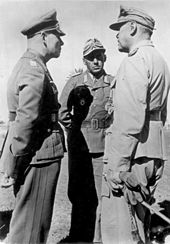This article needs additional citations for verification. (October 2012) (Learn how and when to remove this template message)
|
| Fritz Bayerlein | |
|---|---|
 | |
| Born | 14 January 1899 |
| Died | 30 January 1970 (aged 71) |
| Allegiance | |
| Service/branch | Army (Wehrmacht) |
| Rank | Generalleutnant |
| Commands held | 3rd Panzer Division Panzer Lehr Division LIII Army Corps |
| Battles/wars |
World War II
|
| Awards | Knight's Cross of the Iron Cross with Oak Leaves and Swords |
Fritz Hermann Michael Bayerlein (14 January 1899 – 30 January 1970) was a general in the Wehrmacht of Nazi Germanyduring World War II. He initially served as a staff officer, including with Erwin Rommel in the Afrika Korps. He then commanded the 3rd Panzer Division, the Panzer Lehr Division and LIII Army Corps in the European theatre. Bayerlein was a recipient of the Knight's Cross of the Iron Cross with Oak Leaves and Swords.
Contents
[hide]World War II[edit]
Bayerlein served as a staff officer of General Heinz Guderian for the invasion of Poland and the Battle of France. In Operation Barbarossa, the invasion of the Soviet Union, during June 1941, Bayerlein was assigned to Guderian's Panzer Group 2 staff. After the Battle of Kiev, Bayerlein was transferred to Generaloberst Erwin Rommel's staff. Bayerlein was moved to theFührerreserve in August 1942, then reassigned to the Afrika Korps as Chief of Staff.
He served as a staff officer under the command of Generalmajor Walter Nehring beginning in March 1942 upon Nehring's transfer to Africa. Later, he served under Erwin Rommel and Wilhelm von Thoma. When Rommel left Tunisia in March 1943 after the failed attack during the Battle of Medenine (Operation Capri), Bayerlein was appointed German liaison officer under the new commander, Italian Giovanni Messe. He was sent to Italy before the German troops in Tunisia surrendered on 12 May 1943. Bayerlein was sent to the Eastern Front in October 1943, to lead the 3rd Panzer Division, which was surrounded at Kirovograd. Bayerlein led a breakout through the Soviet encirclement.
He was reassigned to command the Panzer Lehr Division, which moved to Normandy on 7 June. During the Allied Operation Cobra, Allied bombing near Saint-Lô decimated the division. The remnants of the Panzer Lehr Division slipped out of the Falaise pocket and moved east toward Vire in August 1944. The division next took part in the Ardennes Offensive, in December 1944, as part of the XLVII Panzer Corps; Bayerlein was relieved of command following the failed offensive. He took command of the LIII Army Corps in February 1945 and surrendered to the U.S. Army in the Ruhr Pocket on 19 April 1945.
After the war[edit]
Bayerlein was a prisoner of war from April 1945 through April 1947. During this time, he and many other generals in Allied captivity wrote the European battle histories for the U.S. Army Historical Division. Bayerlein was released on in 1947. He wrote about military subjects and continued his work for the Historical Division. He died in 1970.
Awards[edit]
- Iron Cross (1914) 2nd Class (30 August 1918) & 2nd Class (13 September 1939)[1]
- Iron Cross (1939) 1st Class (27 September 1939)[1]
- German Cross in Gold on 23 October 1942 as Oberst in the General Staff in the Deutsches Afrika-Korps[2]
- Knight's Cross of the Iron Cross with Oak Leaves and Swords
- Knight's Cross on 26 December 1941 as Oberstleutnant in the General Staff and Chief of the General Staff of the DAK[3]
- 258th Oak Leaves on 6 July 1943 as Generalmajor and German Chief of Staff of the 1st Italian Army[3]
- 81st Swords on 20 July 1944 as Generalleutnant and commander of the Panzer-Lehr-Division[3]
References[edit]
Citations[edit]
Bibliography[edit]
- Patzwall, Klaus D.; Scherzer, Veit (2001). Das Deutsche Kreuz 1941 – 1945 Geschichte und Inhaber Band II [The German Cross 1941 – 1945 History and Recipients Volume 2] (in German). Norderstedt, Germany: Verlag Klaus D. Patzwall. ISBN 978-3-931533-45-8.
- Scherzer, Veit (2007). Die Ritterkreuzträger 1939–1945 Die Inhaber des Ritterkreuzes des Eisernen Kreuzes 1939 von Heer, Luftwaffe, Kriegsmarine, Waffen-SS, Volkssturm sowie mit Deutschland verbündeter Streitkräfte nach den Unterlagen des Bundesarchives [The Knight's Cross Bearers 1939–1945 The Holders of the Knight's Cross of the Iron Cross 1939 by Army, Air Force, Navy, Waffen-SS, Volkssturm and Allied Forces with Germany According to the Documents of the Federal Archives] (in German). Jena, Germany: Scherzers Militaer-Verlag. ISBN 978-3-938845-17-2.
- Thomas, Franz (1997). Die Eichenlaubträger 1939–1945 Band 1: A–K [The Oak Leaves Bearers 1939–1945 Volume 1: A–K] (in German). Osnabrück, Germany: Biblio-Verlag. ISBN 978-3-7648-2299-6.
- Willmott, H.P. (1984). June 1944. New York, NY: Blandford Press.
External links[edit]
- Fritz Bayerlein in the German National Library catalogue
| Military offices | ||
|---|---|---|
| Preceded by General der Panzertruppe Walther Nehring | Acting Commander of Afrika Korps 31 August 1942 | Succeeded by General der Panzertruppe Gustav von Vaerst |
| Preceded by Generalleutnant Franz Westhoven | Commander of 3. Panzer-Division 25 October 1943 – 5 January 1944 | Succeeded by Oberst Rudolf Lang |
| Preceded by none | Commander of Panzer-Lehr-Division 10 January 1944 – August 1944 | Succeeded by Oberst Rudolf Gerhardt |
| Preceded by Oberst Paul Freiherr von Hauser | Commander of Panzer-Lehr-Division September 1944 – 15 January 1945 | Succeeded by Generalmajor Horst Niemack |

Comments
Post a Comment